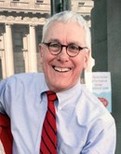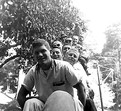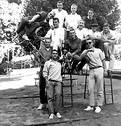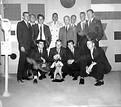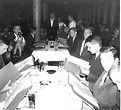|
David Fitzharris
Other "Buck stories:
Of course, there was the famous incident concocted by Buck Delventhal against Carl Lind. He had the bright idea of stringing Carl’s bunk up between the Jackson sleeping porch and Bryson, one story up! Brother Lind came back from a late date, searching for his bed. When he finally found it suspended in the air (it had taken several brothers working in coordination to get it up), he failed to see the hilarity. He yanked and pulled – or maybe just cut – the supporting ropes from one side and the bed came crashing against the side of the house. No wonder we needed a rebuilding fund.
*******
From Torsten Jacobsen (known for his demented sense of humor):
At a Friday evening special dinner with dates I am sitting between Tony status post beer and Buck Deventhal with his first time date. Buck decides to take out his prosthetic eye, put it in his mouth and turn to his first time date. She is totally shocked. He starts to laugh, almost swallow it. If he had to undergo a proctoscopic exam, the G.I. guy would probably think that he had gone too far when he encountered an eye looking back at him.
********
Speaking of Buck's false eye, there was the ROTC story. In those days, all freshman and sophmore male students were required to take ROTC. Obviously, Buck would be exempt, but he when through the physical anyway. He memorized the eye chart and passed with flying colors. After a few weeks of parading around with the rest of us, he went into the Commandant's office and told him he didn't want to be in ROTC anymore. The Commandant huffed and puffed and told him he had no choice ... upon which Buck leaned forward, showed him the false eye and said "Tap, tap". Needless to say, he left the program.
******
Buck had a gift for languages. He was especially fluent in Spanish and frequently tested my 4-year high school Spanish. He'd come up to me and issue forth a long monologue in Espanol, followed by a grin, a nod and a wink, saying "Eh, Cabron?", like we were sharing a good joke. Except "cabron" in Spanish means "bastard".
But he also took German, French and Russian. I remember nights in the sleeping porch, where most guys were snoring, but Buck was talking in his sleep. In Russian.
*********
Buck was always concerned about his fitness. He would eat well, hike often, ride his bike to work and swim regularly in a sheltered part of the San Francisco Harbor. Some time ago (maybe 30 years), he was swimming alone in the early morning hours. Something happened -- hypothermia, perhaps -- and he was in trouble. Fortunately, some rowers were nearby and saw his situation. They brought him on board and he was evacuated to the hospital, unconscious. When he awoke, guess who was sitting at his bedside? Dianne Feinstein!
| 10/28/19 09:40 AM |
#3 EDIT DELETE |
|
Richard 0268 Helm
I recently received a magazine from Hastings College of the Law, featuring outstanding alumni. While flipping through, there was a picture of Buck, listing his significant achievements, including receiving an international award (I think), which is not given every year. I had no idea. His bio was between that of Willie Brown and Kamala Harris.
We e-mailed a bit after that and I was astonished that he remembered me and something about my family. He was a great prankster and a really funny guy.
Rick 0268 Helm
|
| 10/28/19 01:44 PM |
#4 EDIT DELETE |
|
Larry 0158 McClish, Md
I also remember that Buck was really strong in my senior year I was weight lifting and playing football. I thought I was pretty strong. We had an inter fraternity track meet and Buck threw the shot 3-4 feet past me. And he did not weight lift. Ha! Larry McClish
|
|
| 10/28/19 06:57 PM |
#5 EDIT DELETE |
|
Steve 0242 Isle
BE 242Buck was perhaps the most memorable of all my Theta Xi Fraternity Brothers by virtue of the fact he embodied so much charisma and kinetic energy in everything he did. I suspect we all felt like we were Buck's best friend. He was the first person to be there when he felt you needed assistance. It did not matter how many years it might have been, you started up where you left off. And whether it was the untimely passing of Brother Steve Galovich or Jim Hunt, Buck had all the right anecdotes and memories to help us remember clearly what we had lost and help us through as we treasured our own memories of these special Brothers. I remember Buck confiding in me how he was appalled by Brother Rudy Dressendorfer's use of his toothbrush when Rudy and Mike (?), would come by after an adventure to Mexico in the early 1960's. But Buck would never complain to them,, because that wasn't in his nature. There was a 6294 in the early 2000''s that John Harris, Steve Galovich, Buck Delventhal and an incredible number of the Brothers from the Fraternity House of the early 1960's were in attendance thanks to the efforts of Steve Galovich and others. That was the last time I saw and visited with Steve Galovich or Buck. But I knew when we next saw each other, we would continue our conversation from right where we last stopped. God bless Buck, Steve and the other Brothers who have preceded us to that other shore. Won't be long until we start up right where we last left off. We are each better for having known them!!
Steve Isle
|
|
| 10/29/19 11:22 AM |
#7 EDIT DELETE |
|
Bob 0098 Orr
As Buck was a few years younger than I, we did not live in the house at the same time. But while in school at Berkeley, I used to travel to Davis occasionally on weekends, and that's where I first met him and became aware of his unique talents and reputation. But in recent years I had a better opportunity to know him and to appreciate those talents. For me he was a major draw when planning to attend (or not) brother Bill Charlson's annual fall weekend gathering at his beautiful Lillaskog lodge near Groveland. There he was probably at his best, regaling the group with tales of San Francisco and his explanations and descriptions of behind the scenes activity on whatever topic any of us inquired about.......He will be greatly missed at these events and many more!
|
|
| 11/13/19 08:52 AM |
#8 EDIT DELETE |
|
David Fitzharris
Burk Edward Delventhal
November 12, 1942 - October 26, 2019
Died unexpectedly in San Francisco, surrounded by family, on Saturday, October 26, 2019. Buck, as he was affectionately known, was born on November 12, 1942, in Oakland, Calif., to Leo and Eleanor Delventhal. He was raised in Piedmont, graduating from Piedmont High School in 1960. He attended UC Davis, graduating in 1965, followed by UC Hastings College of the Law, where he earned his J.D. in 1969.
In June 1970, he joined the San Francisco City Attorney's Office, embarking on what would become a nearly 50-year career as a Deputy City Attorney for the City and County of San Francisco. Buck took pride in working at his beloved City Hall, where he was regarded by all as a beacon of integrity, dedication and unparalleled legal brilliance. He helped pursue groundbreaking work on behalf of all San Franciscans and played a role in nearly every civic and legal issue facing San Francisco during his years as a public servant. Buck, who led the City Attorney's Office's Government Team since its inception in the late 1970s, served under four City Attorneys, and provided counsel to 10 Mayors, countless Supervisors and numerous Department Heads. He argued landmark cases in the California Supreme Court, California Courts of Appeal and the Ninth Circuit Court of Appeals. He was frequently heard to say how much he looked forward to coming to work each day, not knowing what interesting new issue might find its way to him. For Buck, this was not a job, it was a calling.
Buck was a lifelong learner and teacher, whose insatiable curiosity and fascination with languages, history, science, and the natural world were infectious and endearing. In recent years, he served as an Adjunct Professor at UC Hastings, where he taught a course on State and Local Government Law. He took great joy in inspiring the next generation of attorneys to pursue careers in public service and was a mentor to many of them. Buck was truly a teacher to us all, with his most profound lessons imparted by his example of empathy, humility and boundless optimism. He lived his life fully, and with a deep understanding of the priceless gift that each new day represents.
Buck was an athlete, whose pursuits included running, bicycling and Bay swimming, the latter as a passionate and revered member of the South End Rowing Club in San Francisco. His exploits as a member of the South End included countless pre-dawn swims with his fellow Southenders, numerous Golden Gate and Alcatraz swims, surviving a near-death brush with hypothermia in December 1987, and coaxing many an unsuspecting soul over the years into joining him for a morning dip in Aquatic Park's bracing waters.
Over the last 15 years, Buck spent most weekends with his wife, Monica Martin, at their home in Bolinas overlooking Duxbury Reef, where the two spent days tending the garden, working on an endless stream of small construction projects dreamed up to deplete his equally endless supply of energy, enjoying time with family and friends, and basking in the raw, natural splendor of the land and sea.
Buck is survived by Monica, of San Francisco, his brother, Mark Delventhal, of Piedmont, his son, Ivan Delventhal (Giscela Delventhal-Wong), of Piedmont, and daughter, Juliette Delventhal (Pawel Kruk), of Bolinas, and his four grandchildren, Diego, Zoë, Lucas and Theo, who were the light of his life. He was preceded in death by his first wife, Claude Delventhal, and brother Kent Delventhal.
A memorial and celebration of Buck's life will be held on Tuesday, December 3, 2019, at 11 a.m., at San Francisco City Hall.
In lieu of flowers, donations may be made to the UC Hastings Legal Education Opportunity Program (LEOP), created to make legal education accessible to students from adverse backgrounds.
Published in San Francisco Chronicle from Nov. 1 to Nov. 3, 2019
|
|
| 11/13/19 08:57 AM |
#9 EDIT DELETE |
|
David Fitzharris
Colleagues Remember Buck Delventhal, Longtime 'Beacon' of SF City Attorney's Office
In 49 years of work for the city attorney's office, Delventhal played a role in many defining moments in San Francisco's recent history.
By Cheryl Miller | November 01, 2019 at 08:49 PM
Burk “Buck” Delventhal didn’t vote on the ordinances that make up the tome that is the San Francisco city charter. But the chief deputy of the city attorney’s office helped draft many of them. And he knew them all, past versions and amendments, revisions and additions, friends and colleagues said.
So when a city politician wanted information or an opinion, Delventhal always seemed to have a ready answer and some historical context—even if it wasn’t necessarily what a mayor or supervisor wanted to hear.
Delventhal, 76, died Oct. 26 after a sudden and brief illness, shocking an extended legal and municipal community that remembered the Piedmont native as an advocate, historian, scholar, avid swimmer and biker and, above all else, a constant presence in San Francisco government.
On his 40th anniversary as a deputy city attorney in 2010, former Mayor Willie Brown sent him a congratulatory note from China “where you will recall seven years ago I undertook an official trip as mayor that set the stage for one of my more memorable encounters with your independent legal advice (with which I still disagree, incidentally).”
“It is testimony to your sterling reputation as a lawyer that not even the rare difference of opinion could diminish my high regard for your professionalism and dedication to our city,” Brown wrote.
In 49 years of work for the city attorney’s office—he was looking forward to celebrating his golden anniversary in 2020—Delventhal played a role in many defining moments in San Francisco’s recent history, from the aftermath of the assassinations of Mayor George Moscone and Supervisor Harvey Milk to the city’s decision to issue same-sex marriage licenses in 2004.
“Buck Delventhal was not just the oracle of the City Charter, a highly accomplished courtroom attorney, and the go-to person for tough legal questions,” City Attorney Dennis Herrera said. “Buck was a beacon. He was a beacon of inspiration, trust, and boundless optimism. He was a legal lion and an even better person. Over nearly 50 years at the City Attorney’s Office, he quietly helped millions of San Franciscans in countless ways, even though they probably didn’t know he was the one to thank.”
San Francisco City Attorney Dennis Herrera (Photo: Jason Doiy/ALM)
Delventhal joined the city attorney’s office in 1970, just one year after earning his degree from UC Hastings. Short on experience but impressive with legal talent, Delventhal quickly rose through the office ranks.
Delventhal was part of the city attorney team that in 1978 blocked Supervisor Dan White’s attempts to regain his job after he resigned. White signaled he was renewing his court fight and the deputy attorneys were preparing their defense when they learned White had shot and killed Moscone and Milk.
“My first impulse was to call my wife to make sure she was alright,” Delventhal said in a 2009 interview, in which he recalled his fear that White would target the city’s lawyers. “That was a very solemn day around City Hall.”
Delventhal and other attorneys researched the laws regarding succession, providing a legal basis for the board of supervisors to appoint, and a stunned city to accept, Dianne Feinstein as the new mayor.
Delventhal, who earned the moniker “Buck” when a substitute teacher mispronounced his name, worked at City Hall during 10 different mayoral administrations. He successfully argued that cities could ban cigarette vending machines, and he wrote the ordinance providing universal health care in San Francisco, according to the city attorney’s office. He authored legal opinions on city tax measures. And he was an expert on Proposition 13, the landmark 1978 voter-approved initiative capping property taxes.
“I’m hard pressed to think of anything that he didn’t work on,” said Louise Renne, a former San Francisco supervisor and the city’s attorney for 15 years.
His longevity and knowledge gave him cachet with politicians who viewed his opinions as agenda-free, and it made him a regular sounding board for colleagues around the state on municipal government issues.
“I think why he was so popular and revered, you could call him, he would assist you and he never talked down to you,” said Dennis Bunting, a long-time former Solano County counsel and Delventhal friend. “I viewed him as the ethical and intellectual muse. He served two masters: cities and counties.”
His third-floor office was also a frequent stop for fellow city attorneys and the occasional politician seeking advice. Therese Stewart, an associate justice on the First District Court of Appeal since 2014, recalled talking with Delventhal as she prepared to argue for the city against Proposition 8, the 2008 state initiative that barred same-sex couples from marrying.
“He was like a library, only you didn’t have to hunt,” Stewart said. “He was a legal giant and you wouldn’t know it. He didn’t lead with ego at all. He was an amazingly humble person.”
Friends remembered a constantly on-the-go and cheerful man who spoke many languages, had an encyclopedic knowledge and read voraciously. He rose long before the sun each day, rode his bike to Aquatic Park and swam with others in the open waters, occasionally fending off sea lions. He endlessly recruited others to do the same. On an office wall, Renne keeps a photo of herself clad in a blue bathing suit and red cap, swimming alongside Delventhal in the Bay water.
Matthew Davis, a partner at Walkup, Melodia, Kelley & Schoenberger who worked with Delventhal at the city attorney’s office years ago, recalled his former colleague as someone who was renowned for his honesty and ethics but who could also be goofy and liked “really dumb practical jokes.” He would connect his dirty socks with a diaper pin to avoid losing them during a wash but then keep the pin attached to one stocking for future use.
“Buck, what do you have on your sock?” Feinstein asked Delventhal once during a briefing as the attorney sat down to brief the then-mayor, exposing his ankles—and the large diaper clip, a friend remembered.
“He was just someone, if you got to know him and spend time with him, you were changed,” Davis said.
Delventhal is survived by his wife, Monica Martin; his brother; a son; a daughter and four grandchildren. A memorial for Buck will be held on Dec. 3, at 11 a.m., at San Francisco City Hall.
|
|
| 11/13/19 09:12 AM |
#10 EDIT DELETE |
|
David Fitzharris
I have posted just 3 of the many articles appearing after the announcement of Buck's passing. While a bit redundant, they reinforce the fact that Buck was both a local and national treasure. I was privileged to know him and call him my brother. In fact, my pledge brother. He is already sorely missed.
Buck Delventhal dies, and San Francisco loses its most capable guide
Forty-one years ago, City Attorney George Agnost had a nightmare.
“George tells me, ‘Jim, I had a dream last night,’” recalls Jim Lazarus, then a fledgling city attorney. And a terrible dream it was: Burk E. “Buck” Delventhal embarrassed Agnost in front of Gov. Jerry Brown by repeatedly interrupting him and talking out of turn.
“I had to fire him!” Agnost told Lazarus, still shaken from the horrible dream. “I had to fire Buck Delventhal! It was a nightmare!”
It was the summer of 1978 and, soon, San Francisco would be beset by a series of nightmares — real nightmares. Delventhal was a youngish city attorney; he had in 1970 listed his prior occupations on his resume — driving a tractor, working as a bookstore manager, working in a Safeway warehouse — but was hired by the city anyway. Was hired, in fact, before he even left the room because it was clear how smart he was — and how decent he was.
Agnost’s dream “shows the strength Buck had in that office,” Lazarus says, even four decades ago. “He was the heart and soul of the governmental side of the city.”
As he would remain until last week, when City Attorney Dennis Herrera had a nightmare of his own. And there was no waking up from this one: On Oct. 24, Herrera penned a sad letter to his staff that, after 49 years and four months on the job, Delventhal would be retiring immediately to deal with a previously undiagnosed medical condition.
Just two days later, Herrera shocked the staff by informing them that Delventhal was dead, one month short of his 77th birthday and eight months shy of half a century on the job.
Like the caretaker of the Overlook Hotel, it felt as if Delventhal had always been here. His longevity — while remarkable — wasn’t the story, though. Plenty of marginal people hold onto jobs.
It turns out the best way to be a wise and smart old person is to start out as a wise and smart young person. Buck Delventhal was a prodigy from Day One, and then he amassed 49 years and four months of institutional memory.
And this matters, because Delventhal didn’t apply himself to amassing profit or power. He worked for you.
Do you like equality? Delventhal did: He played a major role in this city’s groundbreaking equal benefits legislation and, subsequently, its fight for marriage rights.
Do you like keeping kids from smoking? Delventhal did: He successfully defended the city’s then-novel ordinance banning cigarette machines (younger readers: This is a cigarette machine).
Do you like the Giants? Delventhal did: In 1992, City Attorney Louise Renne tasked him and Jack Bair to scour the team’s lease after the club announced a potential move to Tampa Bay — and, surely enough, the attorneys found a clause that required notice be given by a certain date, which had passed. During the delay, local buyers came forward and the team was saved.
In fact, Delventhal helped save the Giants twice. He helped win the injunction that prevented the team being sold to Toronto-based owners in 1975, staving off the unthinkable scenario of Gary Maddox patrolling center field with a black-and-orange “T” on his hat.
An article in UC Hastings’ newsletter, where Delventhal earned his law degree in 1969 and taught as an adjunct professor, sums up his area of influence thusly: Delventhal’s successful litigation and legislative works have resulted in environmental protections; increases in public health and safety; support for minority businesses; a stronger, more equitable educational system; additional revenues for the City in the post-Proposition 13 era, and myriad other large and small impacts on the lives of the people of San Francisco.
So that’s … everything. He had a hand in everything.
By the way, the legal memo justifying last year’s Proposition C, which may yet open up $300 million a year in homeless and housing funding — that was Buck, too.
When the City Attorney’s office expresses supreme confidence in the city’s ultimate court victory and the access to that money, now you know why.
A regurgitation of Delventhal’s legislative highlights, however, obscures his true and deep role in this city. He was, until virtually his dying day, “the go-to lawyer for the city’s toughest questions,” said Sen. Dianne Feinstein, who broke into city government at around the same time as Delventhal. “I relied on him almost daily during my 18 years in San Francisco government.”
And we really do mean until virtually his dying day; he was reviewing legal briefs written by his governmental team in his hospital bed at CPMC Davies up until he lost consciousness.
Delventhal was a human computer and a human encyclopedia; his younger brother, Mark, recalls him telling a colleague exactly what page to consult in the City Charter. “He had a photographic memory,” Mark Delventhal says. “His memory recall was unparalleled,” adds Supervisor Aaron Peskin.
So there’s that. But very few people praised Dizzy Gillespie for remembering all the notes or Daniel Day-Lewis for remembering all his lines. Delventhal remembered everything, and then he refined it with his stellar legal mind. And he would offer the same analysis to Feinstein or Art Agnos or Gavin Newsom or London Breed or any of the 10 mayors he served — because the law was the law.
We are told, in fact, there was a mayor known for saying “Don’t send Buck,” when proposing new ideas. Some people, it seems, would rather not be informed their plans are dodgy, impractical — or illegal. Our sources asked us not to reveal who this mayor was.
But do we even need to?
|
|
|


.jpg)
